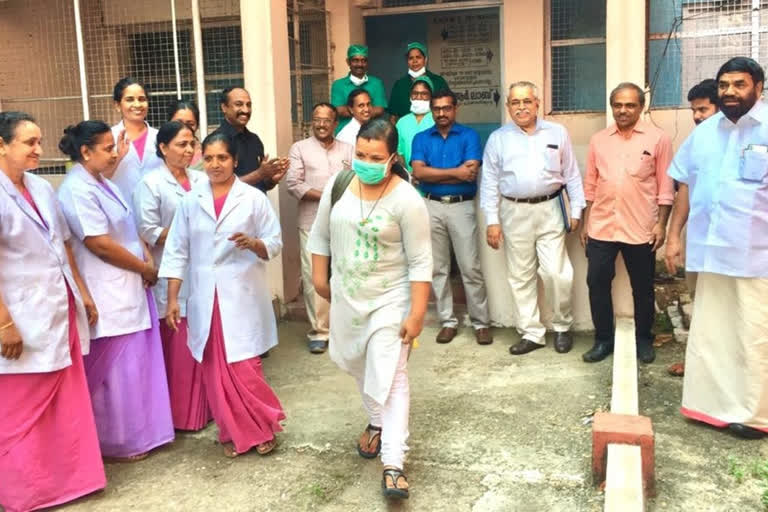"For hours, the health worker ticked through a list of questions: How is your health? What is your state of mind? Are you running out of any food supplies? By the end of the afternoon, she had reached more than 50 people under coronavirus quarantine. Weeks earlier, that number was 200.
Sheeba T.M. was just one of more than 30,000 health workers in the Indian state of Kerala, part of the Communist state government’s robust response to the coronavirus pandemic. Other efforts include aggressive testing, intense contact tracing, instituting a longer quarantine, building thousands of shelters for migrant workers stranded by the sudden nationwide shutdown and distributing millions of cooked meals to those in need. The measures appear to be paying off."
Thiruvananthapuram: This is the beginning of a report published by The Washington Post, an American daily which is popular all over the World, leading to a detailed report on how Kerala’s COVID containment measures and relief plans appear to pay off.
The report begins with health worker Sheeba’s words. There are more than 30,000 such health workers in Kerala visiting each and every home in the remote villages and cities of the State day in and day out, to find out if anyone is sick with similar symptoms. The travel history is traced, if any. Arrangements are made to immediately isolate and quarantine the sick or suspected cases.
Washington Post lavished Kerala’s efforts with praise words. It went on to refer to the State’s preparations as ‘the Communist state government’s robust response to the coronavirus pandemic’.
The report analyses Kerala’s precautionary measures and preparedness in a detailed and comprehensive manner. The Washington post points out that Kerala’s approach to the contagion was “strict and humane”, as told by a leading virologist and infectious diseases expert.
All the proactive steps taken by Kerala, including the preventive measures taken to check the spread, early detection, strict quarantine instituted for suspect cases, intense contact tracing, route mapping, aggressive testing and effective treatment, are appreciated by The Washington Post.
The report says, “In 30 years of Communist rule, the state has invested heavily on public education and universal health care,’’ making it the best performing public health care system in India.
This strength allowed Kerala “to follow the World Health Organisation’s recommendation on aggressive testing, even as the central agencies maintained that mass testing is not feasible in a country like India”.
Kerala had conducted more than 13000 tests through the first week of April. In comparison, larger states of Andhra Pradesh and Tamil Nadu, with a similar or higher number of cases, could do the tests for only 6000 and 8000 respectively.
Read: 'We shall overcome': Kerala proudly announces to the world
Quoting Henk Bekedam, the World Health Organization’s (WHO) representative in India, the report says Kerala’s “prompt response” to its past “experience and investment” has helped in well equipping even the district level health workers in emergency preparedness.
During the lockdown, the State “delivered uncooked lunches to school children, liaised with service providers to increase network capacity for Internet at homes and promised two months of advance pension.”
Community kitchens were established in every nook and corner of the State to ensure cooked food for all those in need. Migrant labourers, who are called ‘guest labourers’ in Kerala in a very dignified manner, are taken care of very well. Their food, accommodation and medical needs are the State’s responsibility during the lockdown. The homeless people living on the streets are also attended to. Kerala police and fire brigades joined hands in the efforts to home deliver medicines for free to the needy persons anywhere in the State. Even the starving stray animals on the streets were given due attention by the state government.
Despite being the first state in India to report a positive COVID case in late January, “the number of new cases in the first week of April dropped 30 percent from the previous week.” The recovery ratio in the State is higher than anywhere else in the country at 34 percent, reports The Washington Post. "Aggressive testing, isolating, tracing and treating..” are the ways Kerala followed in “containing the outbreak,” said the report, attributing to Shahid Jameel, a virologist and infectious disease expert.
“The state took the lead in deploying rapid testing kits” for testing COVID 19 and “began walk-in testing facilities, which reduce the need for protective gears for health workers,” this week.
With more than 1 million foreign tourists reaching Kerala in a year, about 90 lakhs expatriates working in foreign countries and travelling home, and hundreds of students studying in China - where the pandemic originated, “the state faced a potentially disastrous challenge”.
Kerala’s success in the fight comes through with “the proactive measures” in “early detection”, quarantine, care and “broad social support” efforts, which could serve as a model for the rest of the country, The Washington Post inferred. It said, the Kerala model “could prove instructive for the Indian Government which continues to see an upward trend” in the COVID curve, despite imposing a harsh and sudden country level shut down.
Things are very clear in the State Health Minster’s words as quoted by the Washington Post: “We hoped for the best but planned for the worst,” said K.K. Shailaja, the state’s health minister, while cautioning that the pandemic is not yet over in Kerala.



